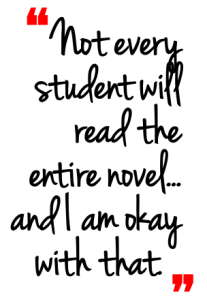How do I get my students to read?

I love receiving emails from my readers and buyers: I enjoy connecting with like-minded people; I appreciate engaging in conversations about education; I value sharing in your experiences.
Recently I had a reader email me to ask about how to get students reading the novels they study in class. Her issue was that every vacation she sends her students away with the instruction to read the set-text over the break so that they can study it on their return; yet every time she finds that most students clearly haven’t read the novel, or they have a Sparknotes knowledge of the book. Therefore, how can she effective analyse the novel in her lessons?
I am sure every high school English teacher can relate.
So here is an adapted version of my reply to this fellow teacher-in-the-trenches.
***************************************************

The important thing is to teach students to effectively study, comprehend and analyse whatever they do read – whether that is the whole text or not. If they are never going to read the book cover to cover, fine. But then I need to make sure that what they do read and analyse, is done in such a way as to inspire them to read more; in such a way which effectively teaches them the tools for analysing literature – after all, isn’t that what we are trying to do? To teach them how to appreciate literature, rather than just teaching novels?
That said, I do think that there are ways to get students to read more than they are perhaps currently doing. Here are a few of my thoughts:
1. Reading in class is not a waste of time.
If we spend the entire lesson just reading aloud and then send our students home with questions, then yes, that may not be the most effective use of teaching time. However, guided reading is extremely beneficial when correctly led by the teacher. What I often do is read the passage/chapter beforehand, and annotate the important points with a pencil. Then when we read in class I pause after each salient part of the text and encourage discussion. I stop and ask questions such as:
– “What do you think about what that character just did?” (Aids opinion-based skills.)
– “What do you think might happen next?” (Helps students with making predictions.)
– “Where else have we seen this issue?” (Teaches students to draw together themes.)
– “How do you think this character is feeling?” (Helps develop inferential skills.)
– “How or why is this event important?” (Facilitates higher-order thinking.)
I aim these questions at specific students and try to facilitate a class discussion around the point. Whenever a student gives an answer I immediately throw it over to another student and ask, “Do you agree? Why or why not?”
I find this to be more valuable than students reading at home as it doesn’t just get the story down in their minds, but it teaches them to be critical readers. It helps guide the particular things they should be thinking about when reading – teaching them to connect the dots and make the connections necessary for literary analysis.
2. I try to set tasks which necessitate close reading.
This is something I have learnt to do. Rather than just set questions on a chapter, I try to create engaging tasks which require students to open their novels and do some investigating. It is difficult to explain this without using a specific novel as example. So here is a free download of my ‘Chapter-by-chapter’ worksheets for Lord of The Flies as an example. In these you will see that I have tried to create worksheets for each chapter which are more creatively engaging than just questions, and for which students cannot simply ‘Google’ the answer. I find that these help students to delve deeper into the novel and necessitate a closer reading of the text.
3. Ask students to read manageable amounts.
I really have given up expecting students to read entire novels in the school holidays. Partly because I just know that they won’t and I really just don’t want to go through the disappointment of assuming they have read the novel, only to find that our discussions go nowhere. But also, in part because I don’t actually want them to have read the whole novel before we tackle it in class. I rather enjoy the process of working through the novel with them. It is very difficult to get their initial reactions to situations when they already know the ending. Therefore I will work through a novel, often setting them small manageable amounts of reading for homework. For example:
Day 1 – We read and discuss chapter 1 in class and I set some sort of written homework in response to this initial chapter.
Day 2 – We read half of chapter 2 and then we do some group work/analysis in class. Then homework is to read the remainder of chapter 2.
Day 3 – We discuss what they read for homework and start reading chapter 3. They finish reading chapter 3 for homework.
Day 4 – We have an analysis lesson in which we review the first three chapters/main themes etc. and do some sort of written task for homework.
Note: I vary rarely give written tasks and reading for homework. Otherwise I find that students do the written work (because that can be proven) and don’t bother reading! In this way they often then see the days of ‘reading’ homework as pleasurable. Plus the amount they have to read is manageable. I encourage them to spend only 20 minutes reading in bed before they go to sleep.
4. Choosing books wisely.

So length is important, but also choosing a book they will relate to and enjoy. As much as I think Lord of the Flies is a great novel, the reality is that it is dated and kids can’t often get into it. Comparatively, I taught in South Africa for three years, and taught a book called Skyline to my Grade 9s. The narrator is a 14-year-old girl and it is set in Cape Town in 2012 – in a block of flats down the road from where I was teaching. My students loved this as it dealt with issues they could relate to, it was modern and interesting and we had some fantastic discussions and debates. I see many teachers on TeachersPayTeachers selling resources for the Hunger Games or The Hate You Give – I have never taught these but I can imagine they grab students’ attention. I know that many of my Grade 9s were addicted to those novels; so getting them to actually read wouldn’t be an issue!


